|
|
|
Sort Order |
|
|
|
Items / Page
|
|
|
|
|
|
|
| Srl | Item |
| 1 |
ID:
107286
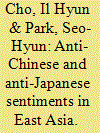

|
|
|
|
|
| Publication |
2011.
|
| Summary/Abstract |
Spanning the presidencies of George W. Bush and Barack Obama, anti-Americanism has become somewhat of a growth industry. Its products are avidly consumed not only in the United States but around the world, often for quite different political purposes. It is not surprising that anti-Americanism plays a large role among traditional enemies of the United States in the Middle East.1 But the same is true of America's allies just across the border, such as Canada and Mexico, and living far apart, such as Australia and New Zealand.2
It would be a big mistake, however, to think that these oppositional sentiments-the complex mixture of opinion, distrust and prejudice-are directed only against America. It plays a role in all parts of the world. Secondary or subordinate states in each world region resent the regional top dog. Such resentment can take various political forms. In Europe, latent anti-German feelings linger, sometimes very close to the surface. When Germany takes a stance against its partners in the European Union, as it has at various times in the unfolding financial crisis, historical anti-German sentiments are quick to appear. Small states in Latin America and Africa also harbour resentment against the self-proclaimed leadership roles of Brazil and Nigeria. And in the Middle East, cross currents of nationalism and religion generate different kinds of political resentment.
East Asia is no exception to this generalization. A large literature focuses on the role of history in shaping the region's current political fault lines. Even minor political crises of the day reveal lingering, deep resentments. In sharp contrast to Europe, however, painful historical memories continue to shape directly, even to provoke, current political crises. This is one important reason why, in a world of regions, East Asia differs from Europe.3 The heavy hand of history, however, has …
|
|
|
|
|
|
|
|
|
|
|
|
|
|
|
|
| 2 |
ID:
154648
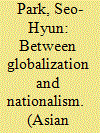

|
|
|
|
|
| Summary/Abstract |
Why, in recent years, has the South Korean government introduced various changes in its immigration policy, diverging from a long history of relative closure toward foreign workers in the East Asian region? While existing studies on labor migration utilize pluralistic models of interest aggregation and competition, examining the preferences of different domestic groups such as firms, native labor, and foreign-born immigrants, immigration has long remained underpoliticized in South Korea. Indeed, until the 2000s, the central government maintained strict policies banning the import of foreign labor, overruling other important economic or environmental factors such as sector-specific needs or a shrinking domestic workforce due to an aging population. In this article, I argue that a new political framing of immigration, made possible through a shifting domestic political context in which global human rights norms became more salient, led to important policy changes in the past decade. The South Korean case suggests that globalization has led to greater acceptance of foreign workers, less as a result of economic pressures but rather the pull of global standards, based on the Korean yearning for segyehwa (to become global) and becoming an “advanced” nation.
|
|
|
|
|
|
|
|
|
|
|
|
|
|
|
|
| 3 |
ID:
121730
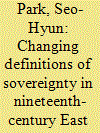

|
|
|
|
|
| Publication |
2013.
|
| Summary/Abstract |
The arrival of Westphalian sovereignty principles in nineteenth-century East Asia was not a uniformly transformative "shock" as commonly assumed. The Sino-centric order did not suddenly disappear; rather it lingered and evolved in a gradual and contested process of change. I argue that enduring domestic understandings of sovereign autonomy affected how Westphalian sovereignty was interpreted in Japan and Korea. Even as the regional structure shifted from regional hierarchy under China to a Western-led international state system, the lens of hierarchy-the long-standing sense of vulnerability and the need to attain autonomous status in a world of great powers-remained unchanged. In addition, each ruling regime in East Asia attempted to reconcile Westphalian sovereignty with existing diplomatic practices to protect its own interests within the Sino-centric order, which resulted in a new hybrid system of interstate relations encompassing notions of both equality and civilizational hierarchy. Within each country, contestation on sovereignty occurred in multiple stages, driven by existing security relationships and changing domestic politics debating the competing standards of civilization in the region.
|
|
|
|
|
|
|
|
|
|
|
|
|
|
|
|
| 4 |
ID:
135294
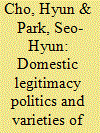

|
|
|
|
|
| Summary/Abstract |
What drives East Asian regionalism? The rise of China and the perceived decline in the influence of the United States have sparked debates about the future of the regional order, including the yet-unresolved question of whose leadership is likely to be more stable and accepted as legitimate by other regional actors. What is puzzling, however, is that persistent demands for the formation of a coherent and uniquely East Asian regional institution have come not from China or the US, as is the focus of existing studies, but rather Japan and South Korea. In this article, we propose an alternative framework that conceptualises the varieties of East Asian regionalism, emphasising the multiple pivots and variegated levels of politics involved in efforts toward regional cooperation. We find that competing proposals for East Asian regionalism since the 1990s are not determined by structural pressures or the convergence of interests but rather result from domestic legitimacy politics. Japanese and Korean leaders have, at different time periods, proposed their own alternative region-making initiatives appealing to domestically contested views on how best to seek autonomy from the region's Great Powers as a way to enhance their political standing domestically and regionally.
|
|
|
|
|
|
|
|
|
|
|
|
|
|
|
|
| 5 |
ID:
193639
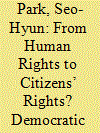

|
|
|
|
|
| Summary/Abstract |
In 2018, the South Korean government denied refugee status to all but two of the almost 500 Yemenis who, fleeing civil war in their home country, had arrived earlier in the year on the resort island of Jeju. This decision was made in the context of a short-lived but intense public backlash, even though the overall number of refugees has remained consistently low. Three years later, nearly 400 Afghans were evacuated to South Korea with government support and little controversy. What explains these different patterns of refugee politicization in South Korea? I argue that the 2018 episode of anti-refugee activism in South Korea does not follow the typical script in immigration politics which pits “natives” against “outsiders”; rather, it is a reflection of internal political divisions. In this article, I focus on political framing contests involving governmental and non-governmental actors that draw upon prior rhetorical frames of political mobilization which had developed in a broader context of state-building, development, and democratization. The 2018 Jeju “crisis” was partially a reaction against state-led multiculturalism (damunhwa), which had gained momentum since the 2000s. It also signalled a political backlash against previous decades of social and political movements that framed labour rights, migrant workers’ rights, and other minority rights as a necessary expansion of human rights befitting a responsible “advanced nation.” At the same time, the varied responses to the arrival of Yemenis in 2018 and Afghans in 2021 show that the coherence and resonance of competing political frames during key moments can help explain the type and degree of political mobilization on refugee policy. Furthermore, these comparative case studies show that South Korean attitudes toward refugees have not settled into stable political-economic coalitions and remain contested and in flux.
|
|
|
|
|
|
|
|
|
|
|
|
|
|
|
|
| 6 |
ID:
157109
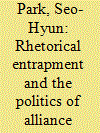

|
|
|
|
|
| Summary/Abstract |
This article is about rhetorical framing and its effects on foreign policy outcomes – specifically in intra-alliance relations. It argues that leaders’ attempts to change the framing of existing security concepts alter the context – and cost – of alliance cooperation. In particular, I highlight the mechanism of rhetorical entrapment as the causal link between initial rhetorical action and the changed context of alliance cooperation. While previous studies of rhetorical entrapment have focused on individual-level reputational costs – such as moral shaming or political backlash when hypocrisy is exposed – I focus on the socially constructed nature of political rhetoric and the consequences of language use. That is, I explore why leaders are compelled to choose certain security rhetoric in the first place and how social resonance and audience receptivity can present unintended political constraints and hidden costs. In this way, the findings from this article contribute to two separate bodies of work in the field of International Relations that have yet to be examined closely in tandem: the role of foreign policy rhetoric employed by leaders as part of their political legitimation strategies, and the domestic politics of alliance cooperation. Through comparative case studies of Japan and South Korea prior to and during the early stages of the Iraq War, I demonstrate the role of rhetorical entrapment in explaining the politics of alliance cooperation.
|
|
|
|
|
|
|
|
|
|
|
|
|
|
|
|
|
|
|
|
|